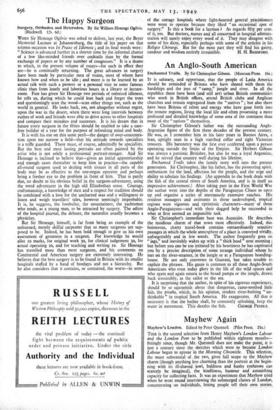An Anglo-South American
Enchanted Trails. By Sir Christopher Gibson. (Museum Press. 16s.)
IT is salutary, and opportune, that the people of Latin America should be reminded of Britons who have shared with them the hardships and the joys of "camp," jungle and river. In all the republics there have been (and still are) urban British communities who work in British offices, attend British clubs and Anglican churches and remain segregated from the " natives " ; but also there have been Britons of talent and energy who have gone forth into the remote regions, living the local life and often possessing a more profound and detailed knowledge of some area of the continent than most of the " natives " themselves.
Sir Christopher Gibson's father was the outstanding Anglo- Argentine figure of the first three decades of the present century. He was, as I remember him in his later years in Buenos Aires, a lean, upright man in a high starched collar and tight Victorian trousers. His baronetcy was the first ever conferred upon a person operating outside the limits of the Empire. Sir Herbert Gibson was always a patriotic Britisher' but also he was a loyal Argentine, and he served that country well during his lifetime.
Enchanted Trails takes the family story well into the present generation. Sir Christopher, like his father, has the pioneering spirit, enthusiasm for the land, affection for the people, and the urge and ability to tabulate his findings. (An appendix to the book deals with the fish of the central rivers of South America, and is its itself an impressive achievement.). After taking part in the First World War the author went into the depths of the Paraguayan Chaco to open up and organise a series of enormously extensive ranches. His resident managers and assistants in those undeveloped, tropical regions were vigorous and optimistic characters—many' of them Anglo-Paraguayans—and with their dogged help he succeeded in what at first seemed an impossible task.
Sir Christopher's immediate base was Asuncion. He describes the -insidious charm of that town most effectively. Indeed, this boisterous, chatty travel-book contains extraordinarily sensitive passages in which the whole atmosphere of a place is conveyed vividly, unforgettably and in few words. The author frequently goes on "jags," and inevitably wakes up with a "thick head" next morning ; but before you can be too irritated by his heartiness he has captivated you by a precise description of some strange individual whom he met on the river-steamer, in the jungle or at a Paraguayan boarding- house. He not only converses in Guarani, but takes trouble to explain the phrases. His gusto is common to all those Anglo-South Americans who even tcrday glory in the life of the wild spaces and who again and again return to the broad pampa or the jungle, drawn back irresistibly, as the sailor to the sea.
It is surprising that the author' in spite of his rigorous experiences, should be so squeamish about that dangerous, razor-toothed little fish, the piratia, which, -in his opinion, renders river-bathing " un- thinkable in tropical South America. He exaggerates. All that is necessary is that the bather shall, by constantly splashing, keep the water in movement. This dazzles the fish. GEORQE PENDLE.






































 Previous page
Previous page